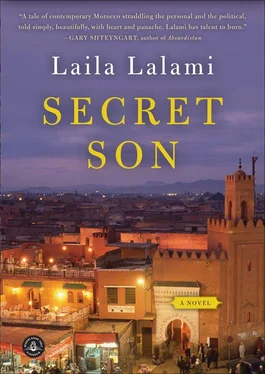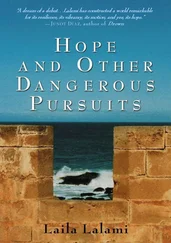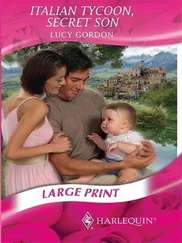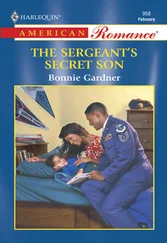At home, Youssef slid the magazine under his mattress. He wondered what his mother would say if he showed her the picture. She would be able to confirm that this was just a man with the same name or, at worst, some distant relation of his father’s. But receiving that reassurance meant having to talk to her.
“Youssef,” she called from the yard. “Go get some water.”
“I don’t feel like going,” he said. “And anyway, getting water is women’s work.” He expected her to reprimand him — he would have welcomed it, because then he could talk back — but she did not say anything. She finished preparing dinner and then went to get the water herself.

The next week was hell. Youssef read and reread a sonnet for his poetry class, without being able to immerse himself in it. During lectures, he stared out the window at the trees swaying in the fall winds, and when he returned to Hay An Najat he avoided his friends because he was afraid he might falter and tell them about the photograph, and about his mother’s secret. He could not sleep at night. Was this man his father? Was his father alive? On Friday he skipped school altogether and stayed home, watching TV. Eventually he dozed off and dreamed that he was a bird, flying around and around, unable to find a resting spot. The creaking of the door when his mother arrived home from work awakened him. The lines around her eyes and mouth were not as pronounced as they usually were, and she had a big smile on her face. The unusualness of this made him do a double take. What was she so happy about?
“They gave me a promotion,” she replied. She would manage the reception team now that her boss had retired, which meant a small raise. “Why are you in your pajamas?” she asked, her eyes full of disapproval and disappointment. “You didn’t go to school today?”
“So what if I didn’t?”
She dropped her purse on the divan and took off her jellaba. She seemed to be weighing what to say next. “You should think of the future,” she said, her tone more conciliatory.
He chuckled. “The way you thought about the past?”
His mother slipped her shoes off and put on her slippers. “What are you talking about?”
He ran inside the bedroom to get the magazine and held it up to his mother’s face.
“What is this?” she asked.
He corrected her: “Who is this?” For a brief moment, he felt like the hero of a courtroom drama, a prosecutor holding Exhibit A in front of a guilty defendant.
His mother gave him an icy glare. “Keep your voice down,” she said. “The neighbors will hear you.” She took her time getting her glasses out of her purse, put them on, and then finally took the magazine from him. Her eyes widened briefly, but otherwise she did not show any emotion. She is such a good actress, he thought, and a part of him admired her for her skill. But another part of him demanded answers and would not let go this time.
Finally she looked up. “What do you want from me?” she asked in a level voice.
“What do I want?” he croaked. “Don’t you know?”
She shrugged.
“Is this … him ?”
She nodded once and handed him back the magazine. He ran into the bedroom again, this time returning with the framed black-and-white photograph. “Then who is this?”
“Stop asking me these questions,” she said. “They’re not going to lead anywhere you want to go.”
“Who is this?” he asked, his voice shaking even as he tried to keep himself from crying. The anger inside him threatened to consume him.
“Youssef Boualem.”
“Who is he?”
“He worked as a driver for the Amranis. He helped me move to Casablanca and find a job.”
“You named me after the driver?”
“He helped me. It seemed like the right thing.”
With all his might, and without being aware that he was howling, Youssef threw the frame against the wall. Glass shards flew across the yard. “Why?” he asked. “Why didn’t you tell me the truth? All of it?”
“And what else could I have done?” she asked. “You tell me. Your father was constantly away, attending political rallies or picketing factories. Your grandmother already had her eye on a wife for him, and I knew he would give in. I had no one, a-weldi. No home. No family. No place to go. And I didn’t want you to grow up like me, in an orphanage, not knowing anyone, not knowing your parents. You already had a mother, but I wanted you to have a father, too. Someone who would be around every day. Was this a crime?” She paused and stared at him with such passion that he stepped back. “I should have killed myself,” she said, without any apparent emotion, just a twinge of regret in her voice, as though she had suddenly decided, nineteen years later, that this would have been the better course of action. “Better to have killed myself than to suffer through this hell, to be punished for having taken care of you and protected you.”
Youssef had not expected that she would force him from the pedestal he had constructed for himself and compel him to see that he was no more in a position to judge her than she him. “If you want to think about the past,” she said, “then suit yourself. But as for me, I’m done with it.”
She walked away, delivering him, once again, to the silence they had barricaded themselves in for the past few months.

When Youssef woke up the next day, his first thought was that his father was alive, that he was somewhere in this city, so near, and yet as unreachable as if he had lived in New York or Beijing. What did Nabil Amrani look like in real life? What did his voice sound like? Was he tall and thin? Or short and stout? Was it true he loved to read, the way Youssef’s mother had repeatedly told him, or did he hate it? Was he married? Did he have children? Did he remember the child he had left behind, or had he forgotten about the past?
Youssef thought of all the summer days he had spent in that musty bookstore storage room, reading. He had always felt a special kinship with the fatherless heroes of literature — from Inspector Ali to Tom Sawyer, from Batman to David Copperfield — but now he saw that all along he had been like everyone else; he had a father and a mother. Still, Nabil Amrani’s existence was something he had to carry inside him; he could neither speak of it nor erase it. It was there whether he was alone or with his friends, whether he was at home or outside. Watching the different cliques at school, he wondered what it would be like to not have to play a part — to know, as easily as everyone else did, which group was his. After all, had he not been the bastard child of his mother, had he instead been the legitimate son of his father, his place in one of these cliques would be clear. The only thing worse than the hell of not knowing where he belonged, he thought, was the hell of knowing.
In class, Alia chatted happily with her friends, occasionally letting out a laugh that felt like a burst of warm sunshine in a cold, dark room. It lifted his spirits so much that he wished he could tape it and listen to it in a loop, all day long. She was talking about a family gathering that had taken place at her grandmother’s house, with many uncles and aunts and cousins attending, and how utterly bored she had been by the musical band her grandmother had hired to entertain them. When the composition professor walked in and everyone turned away from her to face him, Youssef’s eyes were still on Alia.
ON HIS WAY HOME that night, he stopped by the téléboutique to buy a fifty-minute card for his mobile phone. Amin was sitting on the stoop of the store, smoking a Favorite. Youssef leaned against the doorjamb, occasionally stepping aside to let a customer in or out. He listened to Amin talk about Soraya, who, it turned out, was studying law as well. “I saw her in the hallway today, and she was very friendly, if you know what I mean,” he said, winking. “I’m telling you, she’ll be going with me soon.”
Читать дальше













